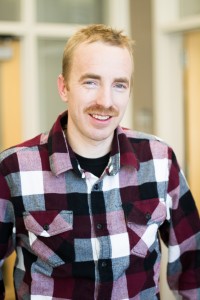
Students of the masters of social work program at BYU come from various backgrounds, but they are united by a desire to serve their fellow men.
“Social workers are really there trying to help the people that are completely forgotten, that are just invisible sometimes,” said Kevin Shafer, professor of social work. “These were people who said, ‘I want to be a social worker because I am interested in these vulnerable groups of people.’ Primarily because, especially here at BYU, that’s who Christ would focus on if he were here today.”
JonPaul “JP” Boyle, from Provo, is one of those students. Having spent two years in active duty training as a combat engineer, Boyle, 33, traveled around the country to various military bases before returning to Utah. For the next six years he was a member of the Utah National Guard before finishing up in 2011.
During that time, Boyle graduated from Utah Valley University, where he studied multimedia communications and sociology. He worked in the outdoor sports industry and the vacation industry. While he did some work with the Anasazi Foundation, which provides outdoor therapy for youth, social work was not the obvious next step for Boyle.
“I think the Anasazi foundation was probably the first place I really started thinking of going into social work,” Boyle said.
In the end, Boyle grew tired of feeling like he was sitting on the sidelines as he watched friends from his time in the military return home and struggle to adjust. His brother, a social worker, inspired him to want to do something to get involved and help.
“It was a shock getting into BYU,” Boyle said. “I hadn’t really planned to go back to school or anything.”
Part of that shock came because BYU’s social work program is the third most selective graduate social work program in the country. Each year, as many as 140 to 170 apply, according to Gordon Limb, director of the School of Social Work; however, only 40 can be admitted. Boyle’s life experience helped to set him apart.
“We value academic work, but we also value experience,” Limb said. “And so we’ve turned away 4.0 students because they don’t have either social work values, or they don’t have experience. So what you’re trying to do is balance people that have good academic preparation that also have good social work potential and values.”
In addition to potential, the program also looks for diversity among their applicants, according to Shafer.
“We are trying to put together 40 people who as a class can help and strengthen each other,” Shafer said. “And one of the things we look for is diversity of experience. … We don’t want to have a group of people who are only social scientists. … So getting someone who has an outside perspective and a different perspective, that’s awesome and we love that. Diversity of life experience, diversity of degrees, we try and deal with all of those things.”
Boyle began in the program Fall 2013. Adjusting back to the rigors of school has challenged him, but it has also helped him to learn about himself and how he deals with difficult situations.
“It forces you to look really, really closely at yourself, and if you can’t handle things, social work is going to break you apart really quick, because it can be hard, it can be depressing, dealing with all the human stuff that happens,” Boyle said. “So that’s one thing I’m grateful for is that I’ve learned things about myself that I really didn’t know.”
As Boyle looks forward he would love the opportunity to return to the military to help; but most importantly, he wants to find where he can make an impact.
“My goal, what I’m shooting for, is to someday do social work for the military, maybe go back in as an officer through their program, or maybe working for the VA with veterans. But at the same time, I’m not so dead set on that that I wouldn’t look at anything else; I just want to find a niche, someplace that I can do my thing.”
One of the best things about the program, according to Boyle, is the people involved.
“Your classmates are just interesting people: we have one girl that’s played volleyball all over the world professionally, people that have already worked in the field for years and years and are coming back. … They are just fun to be around. Not only do they say, ‘I want to help,’ but they have really good reasons for wanting to be where they’re at.”




